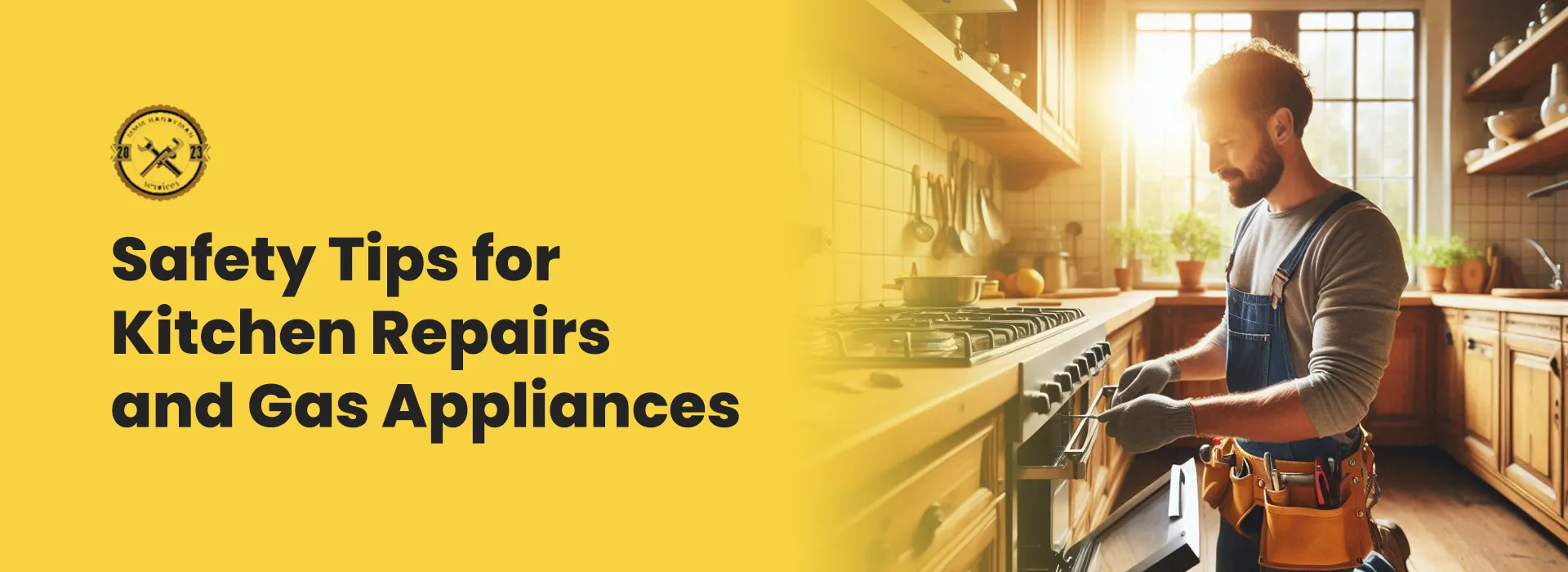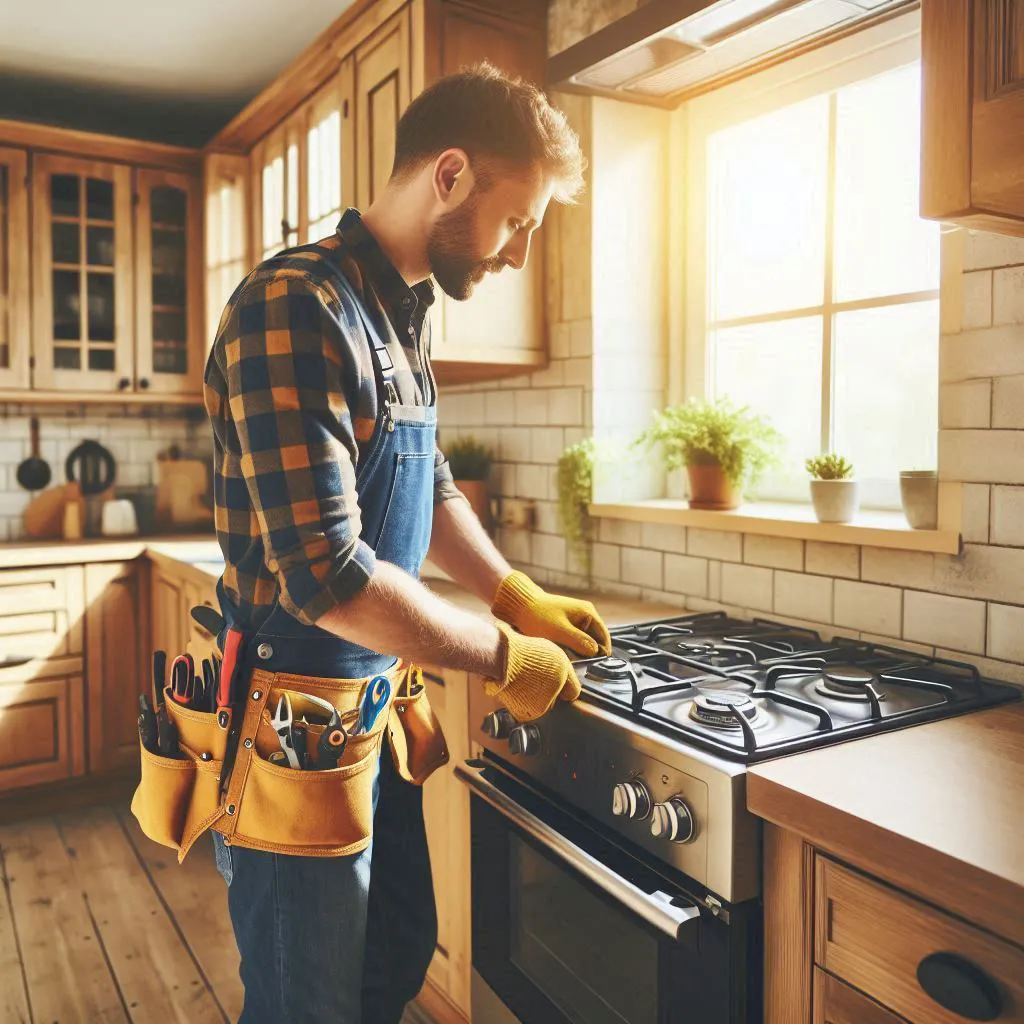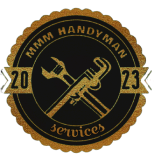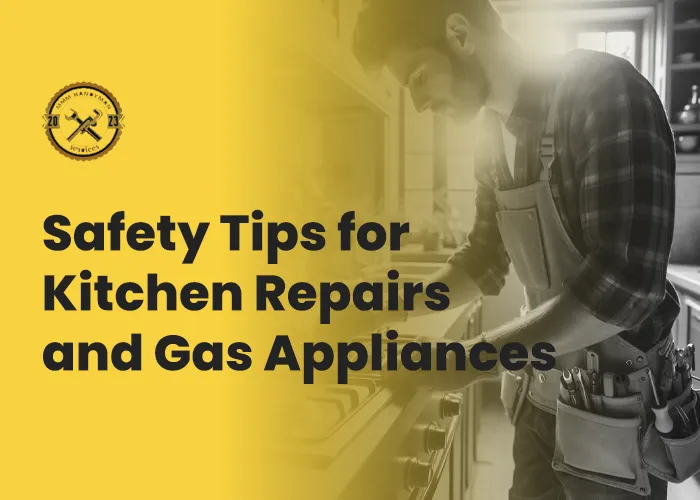
The kitchen is one of the busiest rooms in the house, where multiple appliances work simultaneously to make cooking and food preparation easier. However, it also holds some of the most significant safety hazards, especially when dealing with repairs and gas appliances. Gas leaks, faulty wiring, or appliance malfunctions can put you and your family at risk. Knowing the basics of kitchen safety and practicing caution when repairing or using gas appliances can help prevent accidents. Here’s a comprehensive guide on kitchen repair safety tips to ensure a safe and hazard-free environment.
Table of Contents
Understanding Common Hazards in Kitchen Repairs and Gas Appliances
Gas Leaks: A common hazard in kitchens with gas appliances is a gas leak. Natural gas has a strong odor that makes it easy to detect, but prolonged exposure or a sudden leak can cause serious health risks, including nausea, dizziness, and respiratory problems.
Electrical Hazards: Kitchen appliances often require electricity, and faulty wiring or damaged outlets can lead to electric shocks, fires, or short circuits.
Sharp Tools and Objects: Many repairs involve using sharp tools like knives, scissors, or screwdrivers. Mishandling these tools can lead to cuts or other injuries.
Burns from Hot Surfaces: When working around a stove or oven, hot surfaces can cause burns. This is especially important to keep in mind during and after repairs, as newly installed components may heat up quickly.
Carbon Monoxide Poisoning: Gas appliances can produce carbon monoxide if they are not maintained properly. Carbon monoxide is an odorless, colorless gas that can be deadly if inhaled in large amounts.
Gas Appliance Safety Tips
Gas appliances, like stoves, ovens, and heaters, are essential in most kitchens, but they require careful handling and regular maintenance. Here are some tips to ensure their safe use and repair:
Regular Inspections:
- Schedule regular inspections of your gas appliances to ensure they’re in good working condition. Look for signs of wear and tear, such as cracks, rust, or unusual smells.
- Hire a professional to perform annual maintenance checks. This can help you spot potential issues, like gas leaks, before they become serious.
Detect Gas Leaks Early:
- If you smell gas or hear a hissing sound, it’s crucial to act quickly. Turn off the gas supply, open windows, and leave the area immediately.
- Avoid using electrical appliances, flipping switches, or lighting matches, as these can ignite the gas.
Install Carbon Monoxide Detectors:
- Carbon monoxide detectors should be placed near gas appliances to alert you in case of a leak. Ensure they are checked regularly and that batteries are replaced as needed.
- Familiarize yourself with the symptoms of carbon monoxide poisoning, which include headache, dizziness, weakness, and nausea.
Keep Appliances Clean:
- Regularly clean gas burners to prevent food residue or grease buildup, which can block airflow and lead to incomplete combustion, increasing the risk of carbon monoxide release.
- If you need to remove gas parts for cleaning, follow the manufacturer’s instructions, and make sure everything is reassembled correctly before use.

Electrical Safety Tips for Kitchen Repairs
Electricity is essential in kitchens but can be dangerous if handled improperly. Follow these guidelines to keep yourself safe when working with electrical components:
Turn Off Power:
- Before working on any electrical repair, switch off the power supply at the breaker to avoid electric shocks.
- If you’re unsure which breaker controls a specific outlet, it’s safer to switch off the entire circuit.
Inspect Wiring:
- Check for frayed wires, exposed cables, or loose connections, which can pose a fire risk. If you’re not comfortable with electrical work, hire a qualified electrician to make repairs.
- Ensure that outlets near the sink or stove are equipped with Ground Fault Circuit Interrupter (GFCI) outlets, which automatically cut power if they detect a short circuit.
Use Proper Tools:
- When performing repairs, use tools that are rated for electrical work. Insulated tools reduce the risk of electric shock and ensure your safety.
- Avoid makeshift tools or substitutes, which may not provide the protection you need when working with electricity.
Keep Water Away from Electrical Repairs:
- Water and electricity are a dangerous combination. Ensure your hands and surrounding surfaces are dry before handling any electrical components.
- Do not place electrical appliances near the sink or wet areas unless they are specifically designed for such conditions.
General Safety Tips for Kitchen Repairs
Whether you’re fixing a cabinet, repairing a leaky faucet, or installing a new appliance, it’s essential to follow general safety tips to avoid injuries:
Wear Proper Gear:
- Always wear safety gloves, goggles, and closed-toe shoes when performing kitchen repairs. Gloves can protect your hands from sharp edges, while goggles keep dust or debris out of your eyes.
- Avoid loose clothing and tie back long hair to prevent them from getting caught in tools or machinery.
Have a First-Aid Kit Handy:
- Keep a first-aid kit in the kitchen so you can quickly treat minor injuries like cuts or burns. It should include adhesive bandages, antiseptic wipes, gauze, and burn cream.
- Know basic first-aid procedures, especially for common kitchen injuries, so you can respond quickly in case of an emergency.
Use the Right Tools for the Job:
- Using the wrong tools can lead to accidents or damage. If you’re unsure which tool to use, consult a professional or refer to an instructional guide.
- Avoid over-tightening screws or using excessive force, as this can cause components to break or create potential hazards.
Clear the Workspace:
- Before beginning any repair, remove clutter and ensure that your workspace is clear. Keep the area well-lit so you can see what you’re working on.
- Avoid leaving tools, cords, or equipment lying around as they may cause trips or falls.
Handle Heavy Appliances with Care:
- If you need to move heavy appliances like a fridge or stove, ask for help or use a dolly. Improper lifting techniques can lead to back injuries.
- Always unplug appliances before moving them to avoid electrical shocks and give them time to cool down, especially if recently used.
When to Seek Professional Help
While many kitchen repairs can be handled on your own, certain situations call for professional expertise:
- Gas Line Repairs: Working with gas lines requires specialized knowledge and tools. If you need to install or repair a gas line, it’s best to hire a licensed professional.
- Major Electrical Work: If your repair involves rewiring, replacing circuit breakers, or working with high-voltage components, a certified electrician is better equipped to handle it safely.
- Complex Appliance Repairs: For advanced repairs on gas stoves, refrigerators, or dishwashers, consulting a professional can save time and reduce the risk of further damage or injury.
Conclusion
Kitchen repairs and gas appliances require careful handling and safety awareness to ensure a secure environment. By following basic safety practices, regularly inspecting appliances, and knowing when to call a professional, you can maintain a functional and safe kitchen. From preventing gas leaks to managing electrical hazards, prioritizing safety will keep you and your loved ones protected while making repairs and using kitchen appliances.call us if you needed a handyman for a professional one.

